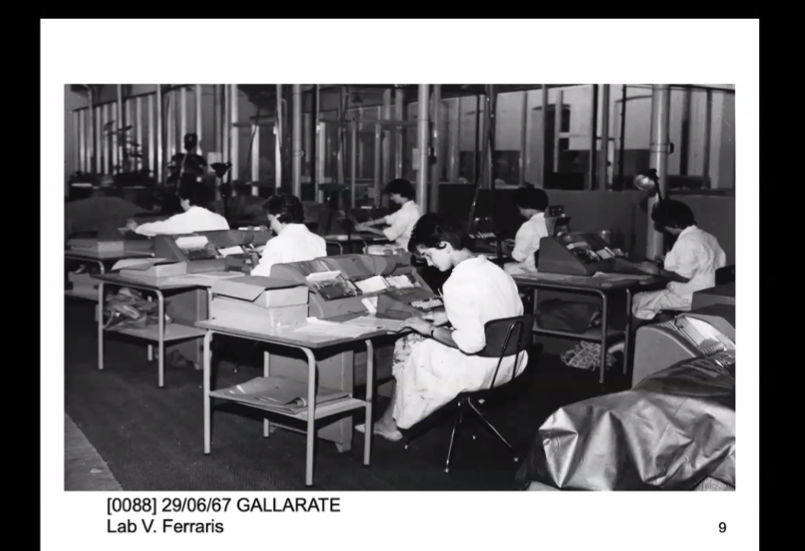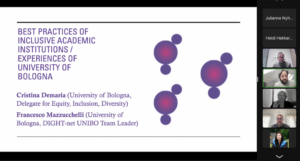 News
News
DIGHT-Net Twin-Lecture Report: Gender, Intersectionality and Inclusion in Academia (Gender, Intersectionality, and Inclusion in Digital Cultural Heritage, Twin Lecture 2)
November 4, 2025

On October 24, 2025, the University of Turku (Finland) hosted the workshop Gender, Intersectionality and Inclusion in Academia, the second twin lecture in the DIGHT-Net online workshop series on Gender, Intersectionality, and Inclusion in Digital Cultural Heritage. This event explored academic institutions as learning and research environments through the lens of gender, intersectionality, and the inclusion of different social groups, including women and marginalised communities. The workshop also aimed to discuss best practices in promoting diversity in academia.
Marek Tamm, Professor of Cultural History at Tallinn University and Principal Investigator of the DIGHT-Net project, opened the lecture by warmly welcoming participants and introducing the ongoing project and its upcoming events.
Petri Paju, Docent of Cultural History at the University of Turku, chaired the discussion and managed the online hosting, assisted by Heidi Hakkarainen, a researcher at the University of Turku. You can watch the video recording of the event on our YouTube channel.
The first presentation was delivered by Julianne Nyhan, Professor at the University of Darmstadt, who gave a talk titled Bridging new futures from the past? Gender and intersectionality in the Digital Humanities. In her talk she discussed the role of female encoders and punch card operators in the Index Thomisticus project (1954–1967), which took place in the emergence of computing and digital humanities. Nyhan argued that technology and gender are deeply intertwined, and that women’s contributions in digital humanities have often remained invisible and devaluated. Gender and class were directly implicated in the hierarchies of esteem and knowledge production. Studying the history of women in the field of digital humanities opens possibilities for critically addressing division of labour and evaluation in today’s digital systems, and for reframing narratives of innovation that reinforce gendered and racialised class-based hierarchies. Bridging the past with the present enables us to imagine new ways of working and shaping the future of digital humanities.
 The second presentation was given by Associated Professor Francesco Mazzucchelli and Professor Cristina Demaria from the University of Bologna. Their talk, Best Practices of Inclusive Academic Institutions / Experiences of Bologna, provided an extensive overview of how equality and inclusion are supported at the University of Bologna through strategic planning, administrative structures, and programs designed to foster diversity at all levels of academia. They reminded that universities do not exist in isolation from society. While it is important to reinforce diversity in strategic planning, it is equally vital to implement guidelines through concrete actions and foster dialogue about the challenges and opportunities that universities may face in the future.
The second presentation was given by Associated Professor Francesco Mazzucchelli and Professor Cristina Demaria from the University of Bologna. Their talk, Best Practices of Inclusive Academic Institutions / Experiences of Bologna, provided an extensive overview of how equality and inclusion are supported at the University of Bologna through strategic planning, administrative structures, and programs designed to foster diversity at all levels of academia. They reminded that universities do not exist in isolation from society. While it is important to reinforce diversity in strategic planning, it is equally vital to implement guidelines through concrete actions and foster dialogue about the challenges and opportunities that universities may face in the future.
Approximately 13 participants from various countries joined the online workshop, which addressed the inclusion of diverse perspectives within academic institutions and shared experiences from a global context. During the Q&A session, participants discussed the evaluation and recognition of merit and excellence in relation to gender and diversity. They also explored the role of language in the production and dissemination of knowledge both within and beyond academia. It was noted that principles of diversity, equity and inclusion have also recently encountered resistance. Awareness of problems relating to exclusion, career path barriers, and power hierarchies that marginalise certain voices highlights the importance of developing new participatory practices to support diversity in academic institutions.
